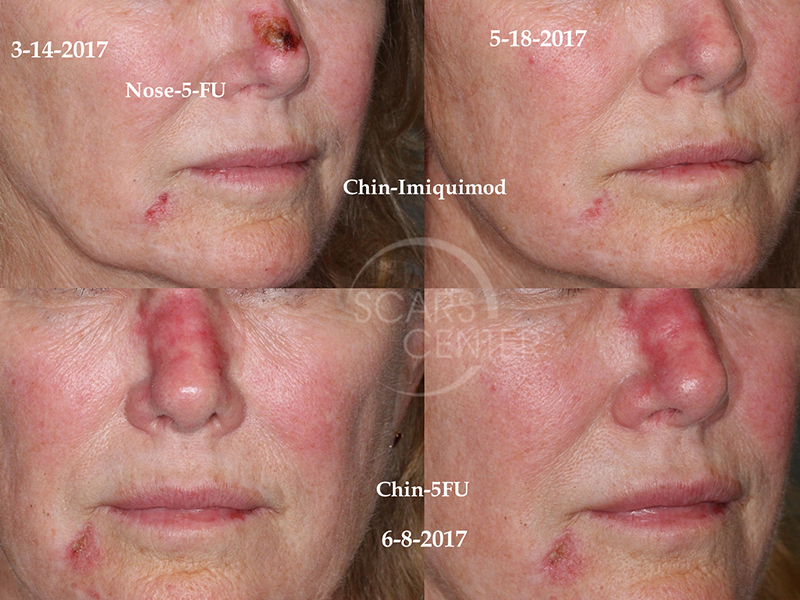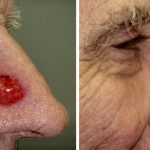Topical 5-fluorouracil and Imiquimod Efficacy in Basal and Squamous Cell Carcinomas
HISTORY
65-year-old woman presented in January 2017 with a nasal dorsum squamous cell carcinoma in situ. The nasal lesion was treated with 6 weeks of topical 5-fluorouracil with a robust inflammatory response. A separate chin basal cell carcinoma was simultaneously treated with 6 weeks of imiquimod prescribed in February, while still undergoing 5-fluorouracil on the squamous cell carcinoma in situ of the nose. 12 weeks of imiquimod on the chin basal cell carcinoma resulted in mild inflammatory response. In May 2017 imiquimod treatment of the chin basal cell carcinoma was completed, and 5-fluorouracil was prescribed for the chin basal cell carcinoma.
DISCUSSION
5-FU (5-fluorouracil) is a highly effective and well-tolerated treatment used for superficial squamous cell carcinomas and squamous cell carcinomas in-situ. Imiquimod has been the mainstay for topical treatment of superficial basal cell carcinomas. However, when some patients fail to mount a response with application of imiquimod, 5-FU becomes an excellent option for topical treatment for basal cell carcinomas. This patient illustrates this scenario.
A study from 2007 published in Dermatologic Surgery has shown efficacy of 5-fluorouracil as a topical treatment for superficial basal cell carcinomas. Success rate was impressive with up to 90% cure rate for all lesions treated. This was determined by histologic analysis. Important take home message from the study was that cure was achieved mainly after 10 weeks of treatment. The maximum treatment course in this study was 12 weeks. It is important to know that at six weeks of treatment, only 13% of lesions were cured. The cosmetic results were superb in all of these cases. 5-FU was a highly effective topical treatment for superficial basal cell carcinomas in this study. The treatment course needs to be 12 weeks.
In contrast, imiquimod has been shown to be similarly effective with treatment courses lasting 12 weeks. At six weeks, Imiquimod appears to be more effective than 5-fluorouracil in achieving cure. It is important to remember that the treatment course for actinic keratosis with 5-fluorouracil can be anywhere from two to six weeks. The treatment course for squamous cell carcinomas in-situ should be around six weeks. However with invasive squamous cell carcinomas, it appears that the treatment duration should extend up to 12 weeks to achieve a 90% cure.
The molecular basis for imiquimod non-responders, is the Toll-like receptor 7 (TLR7) polymorphism. Imiquimod is the agonist for the receptor. Patients with mutated genotype for the receptor are at a greater likelihood of failing to mount a response to imiquimod. The immune response generated by activation of the TLR7 leads to destruction of skin cancers and other abnormal cells in the area of application.


